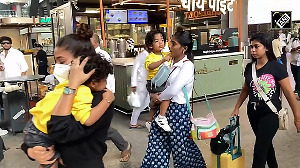There is great news for the lottos and Super lottos of the world -- the city of Kolkata will slash the tax payable on such machines, according to a proposal made by the Kolkata Municipal Corporation.
The new tax has been fixed at only Rs 3000 per machine per annum, against Rs 15,000 per year per machine currently levied now.
According to sources close to the development, KMC would charge the lower levy after the proposal was passed at its forthcoming meeting on December 8, where it was expected to sail through without much of a problem.
KMC had levied the Rs 15,000 tax as a punitive measure as online lotteries were yet to receive necessary clearances from the state government. The online lotteries had started operating under a court order and the state government and KMC were powerless to stop their operation.
KMC then decided to levy the Rs 15000 fee hoping it would act as deterrent and the seemingly high cost would keep businessmen away from running online operations.
KMC felt the operations were not sanctioned but since online lotteries were operating under an interim court order, the best solution in the situation was the high fee.
The fee was mentioned in the KMC budget for the year 2004-05 as well.
The source said KMC revised its decision after online lotteries were recognised as a legal activity by other states in the eastern region.
Levying a huge tax was simply forcing the activity underground, and so the lower annual tax of Rs 300 per machine was expected to bring all online lottery operations under the tax net and ensure better compliance, said the source.
The online lottery business in Bengal was dominated by Playwin, a brand owned by the Essel group.
Annual business was estimated to be in the region of Rs 1,700-1,800 crore (Rs 17-18 billion) this year against Rs 1,200-1,300 crore (Rs 12-13 billion) last year. It has grown by almost 50 per cent thanks to new format games and increased frequencies. Sources in the trade handling paper lottery sales said tickets would fetch around was Rs 700-800 crore (Rs 7-8 billion) this fiscal.
Sales were expected to grow marginally -- by about to Rs 100 crore (Rs 1 billion). The multiple daily draws and hectic ticket sales at online lottery outlets have led to a surge in public protests against such outlets as virtual gambling dens.
Women and at times, some political elements, have protested against the online lotteries. They alleged that sale of tickets and related draws several times in a single day made the activity equivalent to gambling.





 © 2025
© 2025